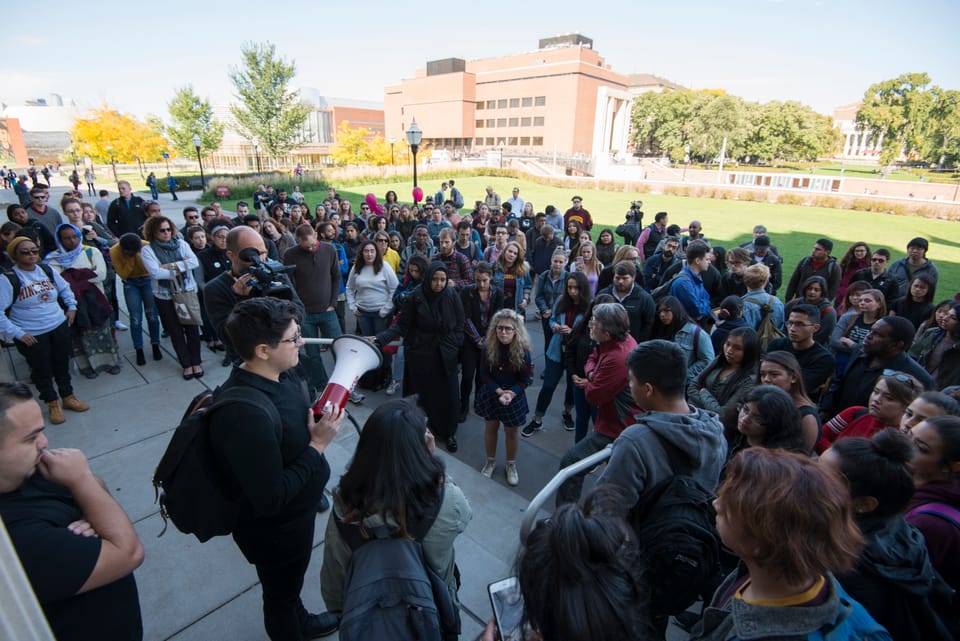Student Protests Have Always Terrified Powerful Interests

In August 1971, tobacco lobbyist Lewis Powell was chatting with his friend Gene Sydnor, education chair for the U.S. Chamber of Commerce, about what the two perceived as an attack on American business and, by extension, democracy as a whole. They agreed that while there were many intersecting drivers of the 1960s backlash against American corporations, the nexus of all of it really was college campuses. Sydnor asked Powell to summarize his thoughts on the issue, and what corporate interests should do to set things right, in a memo, and Powell dutifully complied. In his 35-page memo, he laid out how university campuses and firebrand thought leaders like Ralph Nader (he really had a bee in his bonnet about Nader) were attacking the free enterprise system and ruining the country.
To confront this issue, Powell suggested that American corporations, with the support of the U.S. Chamber, mount a multi-pronged campaign that included: installing conservative faculty on as many campuses as possible, especially in social science departments; demanding that universities host as many conservative as liberal speakers in the name of academic freedom, and applying "both private and public pressure" to make this happen; auditing and editing textbooks to ensure a pro-business slant; requesting that business schools train future executives in how to deal with this problem and protect the reputation of free enterprise; and using the courts—filing amicus briefs and cases—to affect social, economic and political change. The memo was shared with Chamber leadership who were enthusiastic about the potential for the plan Powell laid out. Although it was confidential, Powell's memo was leaked when, a few months later, he was nominated to the Supreme Court.
It has often been referenced in the years since as the genesis of the conservative movement's approach to building power over the last several decades, which is probably attributing more influence to it than it had. Nonetheless, it's hard not to see the world we all live in today typed out in courier font in Powell's mem0. It's especially hard to avoid thinking of the Powell memo as we watch executives and politicians, administrators and police lose their damn minds over campus protests in solidarity with Gaza this week.
For me, after working for the past 18 months or so on a series about the global crackdown on climate protest, it's also hard not to see parallels between the campus crackdowns and the push to criminalize protest more broadly. Particularly when I look at Senate Bill 4136, introduced by Texas Senator John Cornyn last week: it would revoke the tax-exempt status of any nonprofit thought to be "supporting terrorism," and Cornyn and his co-sponsor Angus King (I-ME) claim it's necessary to stop funds flowing from U.S. organizations to Hamas. Lest we ever miss a chance to turn a war into an excuse to strip citizens of their rights. Financing terrorism is, of course, already illegal and there are plenty of laws on the books to deal with it. This one would just make it really easy to accuse any organization of "supporting terror." It's the same type of law we've seen used to shut down civil society groups and repress climate and social justice activists in Mozambique, India, and the Philippines. As in those places, the only function it would serve here is to further repress free speech, something Cornyn and his old pal Ted Cruz supposedly care so much about preserving.
What we're seeing in the reaction to U.S. protests against the Gaza genocide—from the campus arrests to the TikTok ban to this ridiculous new law to "counter terrorism"—runs absolutely counter to the First Amendment; it's part of what we've been calling the real free speech threat. To put an even finer point on it: it's fascism. People really balk at the use of that word, but I don't use it lightly. I'm genuinely not sure what other word one would use to describe a university president calling the police to arrest their students for peaceful protest, a government trying to shut down a media channel because it can't control it, or a law that makes it easy to brand any civil society group a terrorist organization and shut it down.
It's important in times like these to remember why campus protest in particular has stuck in the craw of corporate and conservative America for so long: because it is galvanizing. It's effective. It breeds solidarity. It's inspiring. And probably most importantly, it's empowering. It reminds us all that we should stand up for what's right, too. That all it takes is being willing to show up, maybe bring a tent, yell a bit, paint a sign, and most people can do that. And in fact it is our right to do that, a right people fought long and hard to give us, and one that we shouldn't squander because look at how quickly it is slipping away.
People whose continued power and wealth hinge on being able to behave badly with impunity—to pollute the commons for personal gain, to fund a genocide for political gain, to lock people up just for saying things they don't like—go absolutely ballistic when confronted with the moral clarity of bright young people prepared to sacrifice their personal comfort for the greater good. Is that reductive? Maybe a bit. It's also true.
This week on the podcast
I've been hearing from people for a while that the Drilled feed starts to feel a bit cluttered when we drop newsy episodes and author interviews in there, and after a lengthy battle we've finally reclaimed the Hot Take feed, so...this week we launched a new podcast there. It's called Spill and it will feature regular climate news, interviews with creatives in the climate space (authors, filmmakers and so forth), and a monthly conversation between myself and my former Hot Take co-host Mary Annaïse Heglar about whatever we're fired up about at the moment. Our first episode dropped on Earth Day! You can check it out here and subscribe wherever you get your podcasts (and we'll keep the Drilled feed for narrative seasons only from here on out).
Reporting Update: Joanna Smith Sentenced to 60 Days in Jail + $7000 fine + 150 hours of Community Service for Climate Protest
Joanna Smith, the activist we profiled in our Real Free Speech Threat series, who drew with finger paint on the glass display case surrounding a Degas statue at the National Gallery last April, was sentenced today to 60 days in jail after pleading guilty to "injuring National Gallery property." Setting aside the absurdity of the phrase "injuring property," Judge Amy Berman Jackson took the opportunity to lecture Smith, whose protest she characterized as “narcissism”, “hubris”, “selfish”, “reckless”, “self-indulgent”, and “pointless”, while failing to acknowledge the crisis at hand. The director of the National Gallery, Kaywin Feldman, stressed the gallery’s mission to preserve art forever, unintentionally reinforcing the whole point of the protest: that we can't protect anything "forever" if we won't act to preserve a livable planet. Upon her release, Smith will be required to conduct 150 hours of community service and will be on supervised probation for two years.

This Week's Climate Must-Reads
First, a note: There are fewer and fewer of these stories to choose from. I remember as recently as a year ago it was actually tough to whittle it down to five; now I often feel like I'm casting about to flesh out this list. The decimation of media in general has resulted in a noticeable reduction in climate stories, particularly in accountability or investigative reporting. That makes the work we're doing here at Drilled even more important. Please consider supporting it if you're able!
- The Wall Street Journal called oil and gas a "sunset industry" this week. Justin Mikulka spotted it and highlighted why it's such a big deal in his excellent newsletter, in a piece called "Happy Oil Industry Sunset Day."
- [Podcast] "The EPA's Carbon Crackdown Is Finally Here" - The EPA finally finalized its power plant rules and thankfully the energy wonks at Heat Map are here to walk us through the ins and outs of how these rules will reduce emissions and what they mean for the future of coal and gas.
- ‘Wake-up call’: pipeline leak exposes carbon capture safety gaps, advocates say - by Nina Lakhani for The Guardian. A terrifying story when you consider that the fossil fuel industry, and Exxon in particular, is banking on carbon capture as its get-out-of-jail-free card for the next several decades.
- EU votes to leave energy treaty as green rules pushed through - by Alice Hancock for the FT. The European Parliament passed strong climate legislation this week despite major political and industry opposition. It will be really interesting to see how this plays out over the rest of the year and how it impacts companies headquartered elsewhere but doing business in and with Europe.
- Fellow Freelancers: Don’t Marry Rich, Organize! - by Amy Littlefield for The Nation. When news went digital, most outlets transitioned the bulk of their staff to freelance reporters, making life unstable for the vast majority of journalists and thus news, particularly news in the public interest, unstable. All of which makes democracy unstable! In this piece Littlefield offers an alternative to the "marry rich or have a trust fund" advice most freelancers get: organize and build solidarity. (If you're wondering what this has to do with climate, I can currently count on one hand the number of climate reporters I know who have full-time salaries).





